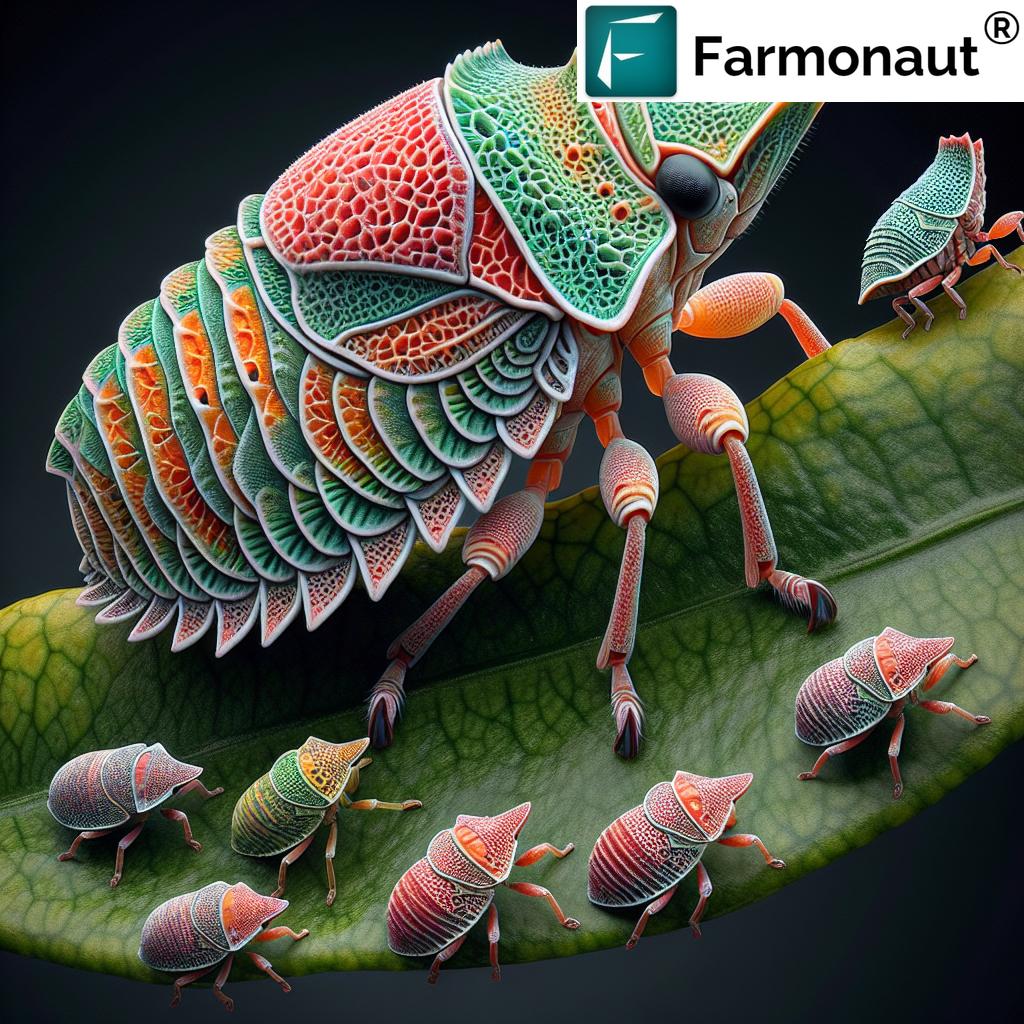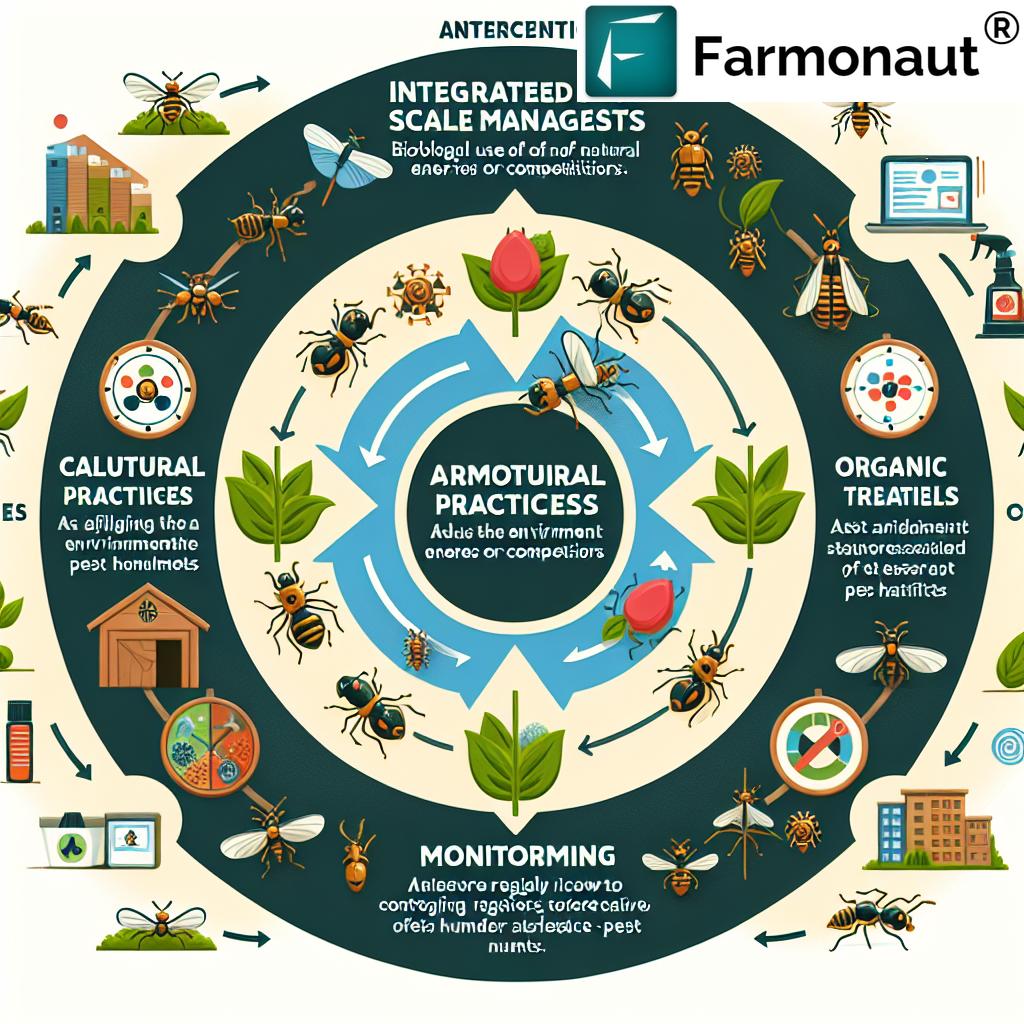Organic Armored Scale Treatment: Effective IPM Strategies for Citrus Plants

At Farmonaut, we understand the challenges that citrus growers face when it comes to managing pests, particularly armored scale insects. These tiny but persistent pests can cause significant damage to citrus plants if left unchecked. In this comprehensive guide, we’ll explore effective organic treatment methods and Integrated Pest Management (IPM) strategies to combat armored scale infestations while minimizing environmental impact.
Understanding Armored Scale Insects
Armored scales (family Diaspididae) are small, immobile insects that attach themselves to various parts of plants, including leaves, stems, and fruit. These pests are particularly problematic for citrus growers due to their ability to quickly reproduce and spread throughout orchards.
Some common armored scale species affecting citrus include:
- California red scale (Aonidiella aurantii)
- Purple scale (Lepidosaphes beckii)
- Citrus snow scale (Unaspis citri)
The Impact of Armored Scale Infestations
Armored scale infestations can have severe consequences for citrus production:
- Reduced plant vigor and growth
- Yellowing and dropping of leaves
- Dieback of twigs and branches
- Fruit blemishes and reduced marketability
- Potential tree death in severe cases
Integrated Pest Management (IPM) for Armored Scale Control
At Farmonaut, we advocate for an Integrated Pest Management (IPM) approach to armored scale control. This strategy combines various methods to manage pest populations effectively while minimizing environmental impact and preserving beneficial organisms.
Key Components of IPM for Armored Scale:
- Monitoring and early detection
- Cultural practices
- Biological control
- Organic treatments
- Chemical control (as a last resort)
Monitoring and Early Detection
Regular monitoring is crucial for early detection of armored scale infestations. Traditional methods involve visual inspections of trees, but at Farmonaut, we offer advanced satellite-based monitoring solutions that can detect pest problems across large areas quickly and efficiently.
| Aspect | Traditional Scale Detection Methods | Farmonaut Satellite System |
|---|---|---|
| Early Detection | Limited to visual inspections | Advanced algorithms detect subtle changes in plant health |
| Coverage Area | Time-consuming for large orchards | Can monitor thousands of hectares simultaneously |
| Labor Requirements | High – requires trained personnel for regular inspections | Low – automated system with minimal human intervention |
| Cost-effectiveness | Expensive for large-scale operations | Highly cost-effective, especially for large orchards |
Our satellite-based monitoring system enables growers to identify potential infestations early, allowing for targeted and timely interventions. To learn more about our innovative solutions, visit Farmonaut’s satellite monitoring platform.
Cultural Practices for Armored Scale Prevention
Implementing good cultural practices is an essential part of IPM for armored scale control:
- Proper pruning to improve air circulation and reduce hiding spots for scales
- Maintaining tree health through proper nutrition and irrigation
- Removing and destroying heavily infested plant parts
- Avoiding excessive nitrogen fertilization, which can promote scale growth
Biological Control of Armored Scales
Encouraging and introducing natural enemies of armored scales is an effective and environmentally friendly control method. Some beneficial organisms that prey on armored scales include:
- Aphytis wasps: These tiny parasitic wasps are highly effective against California red scale and other armored scale species.
- Predatory beetles: Ladybugs and other small beetles can help control scale populations.
- Lacewings: Both adults and larvae feed on scales and other soft-bodied insects.
To promote biological control:
- Avoid broad-spectrum pesticides that can harm beneficial insects
- Plant flowering plants near orchards to provide nectar and pollen for parasitic wasps
- Consider releasing commercially available beneficial insects in your orchard
Organic Treatments for Armored Scale Control
When cultural practices and biological control are insufficient, organic treatments can be an effective next step in managing armored scale populations:
1. Horticultural Oils
Horticultural oils, such as neem oil or mineral oil, are highly effective against armored scales. These oils work by suffocating the insects and disrupting their feeding habits.
Application tips:
- Apply during dormant season for best results
- Ensure thorough coverage of all plant surfaces
- Avoid applying during extreme temperatures
2. Insecticidal Soaps
Insecticidal soaps are another organic option for scale control. They work by breaking down the protective waxy coating of the scales.
Application tips:
- Apply when scales are in their crawler stage for best results
- Repeat applications may be necessary
- Test on a small area first to ensure plant safety
3. Diatomaceous Earth
Diatomaceous earth is a natural substance that can be effective against armored scales, especially in their crawler stage.
Application tips:
- Apply as a dust to affected areas
- Reapply after rain or heavy dew
- Use caution as it can also affect beneficial insects
Chemical Control: A Last Resort
While we at Farmonaut advocate for organic and IPM approaches, there may be situations where chemical control is necessary as a last resort. If chemical interventions are required:
- Choose selective insecticides that target scales while minimizing harm to beneficial insects
- Follow all label instructions and local regulations
- Time applications to coincide with vulnerable life stages of the scales
- Rotate different modes of action to prevent resistance development
It’s important to note that some chemical treatments can be poisonous to humans, animals, and beneficial insects. Always prioritize safer, organic methods when possible.
Farmonaut’s Role in Effective Armored Scale Management

At Farmonaut, we’re committed to helping citrus growers implement effective IPM strategies for armored scale control. Our satellite-based monitoring system offers several advantages:
- Early detection of potential infestations
- Large-scale monitoring capabilities
- Precise targeting of treatment areas
- Reduced reliance on chemical interventions
- Cost-effective pest management
To learn more about how our technology can revolutionize your pest management strategies, visit our API documentation or download our mobile app:
Conclusion: A Holistic Approach to Armored Scale Management
Effective armored scale control in citrus orchards requires a comprehensive, integrated approach. By combining cultural practices, biological control, organic treatments, and advanced monitoring technologies like those offered by Farmonaut, growers can successfully manage scale populations while minimizing environmental impact and preserving beneficial organisms.
Remember, the key to successful IPM is flexibility and adaptation. Regularly assess the effectiveness of your management strategies and be prepared to adjust your approach as needed. With diligence and the right tools, you can protect your citrus crops from the threat of armored scales and ensure a healthy, productive orchard.
FAQ: Armored Scale Control in Citrus Orchards
Q: How can I identify armored scale infestations in my citrus trees?
A: Look for small, immobile bumps on leaves, stems, and fruit. You may also notice yellowing leaves, branch dieback, or sooty mold growth. Our Farmonaut satellite monitoring system can help detect early signs of infestation across large areas.
Q: Are armored scales harmful to humans?
A: Armored scales themselves are not directly harmful to humans. However, some chemical treatments used for control can be poisonous if not handled properly. Always prioritize safer, organic methods when possible.
Q: How often should I monitor my citrus trees for armored scales?
A: Regular monitoring is crucial. We recommend weekly visual inspections during the growing season. With Farmonaut’s satellite monitoring, you can receive updates on crop health and potential infestations more frequently and across larger areas.
Q: Can beneficial insects completely control armored scale populations?
A: While beneficial insects like Aphytis wasps can significantly reduce scale populations, they may not provide complete control in severe infestations. Biological control should be part of a broader IPM strategy.
Q: Are organic treatments as effective as chemical pesticides for armored scale control?
A: Organic treatments can be highly effective when used correctly and as part of an IPM approach. While they may work more slowly than some chemical options, they are often safer for the environment and preserve beneficial insects.
Q: How can Farmonaut’s technology help me manage armored scales in my citrus orchard?
A: Our satellite-based monitoring system can detect early signs of stress in your trees, potentially indicating scale infestations. This allows for targeted, timely interventions and more efficient use of resources. Learn more about our API capabilities here.